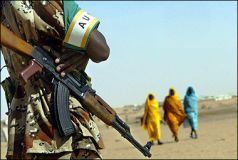Breakthrough in Darfur talks as Sudan govt accepts security deal
ABUJA, Nov 9 (AFP) — Delegates at peace talks on the bloody conflict in the Sudanese region of Darfur made a major breakthough as the government side bowed to international pressure and struck a deal to end hostilities

|
|
Displaced women walk in front of a Rwandan soldier belonging to the African Union Force and patrolling a section of the Abu Shouk displaced camp on the outskirts of El-Fasher, Sudan.(AFP). |
The Khartoum government and its rebel foes signed two accords — the so-called humanitarian and security protocols — in the Nigerian capital Abuja, which is hosting African Union-led peace talks.
Agriculture Minister Majzoub al-Khalifa inked the deal on behalf of his government at a ceremony hosted by the current AU chairman, President Olusegun Obasanjo of Nigeria.
The political leaders of the rebel Sudanese Liberation Movement (SLM) and the Justice and Equality Movement (JEM), Minni Arkou and Mohammed Tugod, also signed the documents.
“You can call this the beginning of a good future. You can describe it as the beginning of peace, security, progress and development in Sudan. You can call it the beginning of friendship and harmony,” Obasanjo said.
Al-Khalifa said: “Now we are beginning to go towards peace. We are sending a new signal to the whole world.”
AU officials said that both sides would be held accountable for future ceasefire violations, and the Nigerian leader warned: “These documents will not be worth the paper they are printed on if they are not scrupulously observed.”
The breakthrough was made possible after the Sudanese government dropped its objection to clauses in the security deal committing it to end military flights over Darfur and to disarm the notorious Janjaweed Arab militia.
“The government is coming round but only under pressure, pressure. That’s the colour of the government,” said SLM spokesman Maghoub Hussain.
AU mediators drew up the protocol to demilitarise the 20-month-old conflict ahead of future talks to find a lasting political solution.
It commits the warring parties to halt all offensive operations and to fully cooperate with the 3,250-strong African Union truce-monitoring force.
And in a separate humanitarian deal both parties agreed to improve the safety of Darfur’s 1.5 million displaced civilians by guaranteeing access to aid agencies and pulling their forces back from around refugee camps.
Following the signing of the deal, Obasanjo urged both parties, and in particular the rebels, to rapidly come to agreement on a broad set of political principles to form the foundation of the next round of dialogue.
AU officials and delegates said that they hoped to break the talks off on Wednesday to allow the envoys to return to the respective camps for a break before resuming later in the year, but that talks would continue overnight.
SLM delegate Abdulwahid al-Nur said: “Our fear is in the implementing. We pray we don’t return to Abuja with complaints of continued killing of people.”
In the meantime on November 18 the UN Security Council is to meet in the Kenyan capital Nairobi for talks on Darfur and Sudan’s other regional conflict with Christian tribes in the south of the country.
Fighting erupted in Darfur, a parched and impoverished region larger than France in Sudan’s remote and rural west, in February last year when the JEM and SLM launched an armed revolt against the Khartoum government.
The rebels claim that the mainly black African people of their region have been politically and economically marginalised by the Arab-led government.
Khartoum responded to the challenge by unleashing the Janjaweed, a proxy force of armed Arab tribesmen whose raids on African villagers triggered a refugee crisis and accusations of a government-sponsored genocide.
International opinion, and a threat by the UN Security Council to impose economic sanctions, forced the government to the negotiating table, and the world community has allowed African leaders to take the role of mediators.
